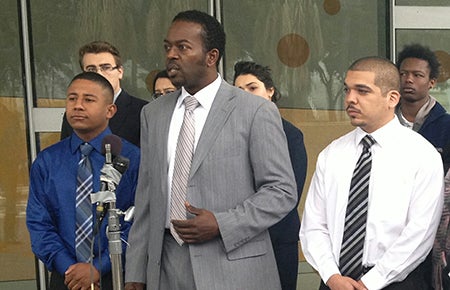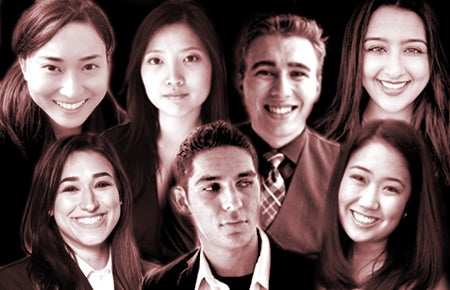
USC Dornsife professor wins suit against L.A.’s unconstitutional gang injunctions
Walking home from his girlfriend’s house late one June evening in 2009, Christian Rodriguez, a 19-year-old from Mar Vista Gardens, a Los Angeles housing project, spotted childhood friend, Alberto Cazarez. But before he could greet him, Rodriguez and Cazarez had both been thrown to the ground and handcuffed by police who ran up to them from behind. Accusing Rodriguez of violating a gang injunction curfew and Cazarez of associating with him, police arrested them both.
In fact, far from being gang members, Rodriguez and Cazarez were straight-A students studying business and Mandarin at West Los Angeles Community College.
Cazarez, a juvenile at 17 years old, was released to his parents; however, Rodriguez was jailed and charged with violating the curfew.
Although innocent of gang involvement, because of an older brother’s gang ties, police deemed Rodriguez subject to the injunction — a court order that aims to curtail gang activity in a designated area. If convicted, he risked prison and being permanently labeled a gang member, an eventuality that would likely result in his family being evicted.
Gang injunctions, argues Olu Orange, adjunct assistant professor of political science, curtail the most basic constitutional freedoms — by prohibiting association with others, being outside at night, being in certain places and saying or wearing certain things.

Olu Orange (center) is flanked by Christian Rodriguez (left) and Alberto Cazarez, the two straight-A students wrongfully arrested in connection with an unconstitutional gang injunction. Photo courtesy of Olu Orange.
“Everything Americans hold dear as quintessential to being American, gang injunctions take away, without even an opportunity to appear in court,” said Orange, a civil rights lawyer and former public defender, who took on Rodriguez’ case. “It’s manifestly un-American.”
Orange succeeded in getting the criminal charges against Rodriguez dropped in 2011.
But the story doesn’t end there.
“When we got the criminal charges dismissed, Chris and Alberto wanted to ensure this kind of injustice didn’t happen to anyone, ever again,” Orange said. “So we filed a class-action lawsuit.”
Now, seven years after Rodriguez and Cazarez were arrested, Orange, with the volunteered help of six USC Dornsife undergraduates and an alumna, has won that lawsuit, forcing the city of L.A. to pay up to $30 million to provide education, job training, apprenticeships, jobs and even gang tattoo removal for those impacted by gang injunctions.
“If a police officer believes you’re a gang member because they’ve seen you in a gang area, or in the presence of gang members, they can serve you with a gang injunction,” Orange said. “Then they have the power to arrest you for violating it, even if you’ve done nothing wrong.”
The result, he said, is that low-income and minority areas affected by gang injunctions are basically transformed into police states where officers can exercise unfettered discretion to take away the constitutional rights guaranteed to people regardless of socio-economic status or racial background.
Orange launched the federal class-action lawsuit in 2011, accusing the Los Angeles Police Department (LAPD) of enforcing curfews written into many gang injunctions for years after they were declared unconstitutional in 2007 by California appellate courts for being too vague — a fact he discovered while preparing Rodriguez’ defense.
“However, LAPD officers and city prosecutors were clearly ignoring the courts’ decision,” Orange said, “because they continued to arrest and prosecute people for violating that unconstitutional provision.”
Fighting for justice
Orange said he couldn’t have achieved this groundbreaking victory without the students and alumna from his “Trial Advocacy: Theory and Practice” course.
First, Orange and his then-intern, MiRi Song, a USC Trial Advocacy Program alumna who graduated with a triple major in philosophy, sociology and East Asian area studies in 2009, determined that 26 out of 43 gang injunctions contained unconstitutional language, affecting almost 6,000 people. “Among them were some hardcore gang members,” Orange said. “But even they deserve the constitutional right to due process that these injunctions violated.”

The volunteers who helped Olu Orange fight for social justice were (clockwise from top left) alumna MiRi Song and undergraduates Min Ji Gal, Mitchell Diesko, Sarah Ayad, Lauren Ige, Angel Lopez and Arpine Sardaryan.
Later, Orange taught Sarah Ayad, Mitchell Diesko, Min Ji Gal, Lauren Ige, Angel Lopez and Arpine Sardaryan the intricacies of search and seizure law. The students then analyzed tens of thousands of pages of LAPD arrest records and presented their findings to the court.
Orange praises his students for doing a phenomenal job. The federal court judge concurred. She cited each of them by name in her decision, relying upon their analysis over the city’s objection in her order certifying the class action.
Orange had triumphed, but he also knew he had to find a creative resolution that was politically acceptable to the L.A. City Council and mayor. After hammering out the job training program with the City Attorney’s office, he succeeded in getting both sides to agree.
A valuable lesson
Orange believes the case taught his students a valuable lesson about effecting societal change.
“We created a social program to remedy the disenfranchisement and marginalization of a large segment of the L.A. population, not through legislative action but through a legal case,” he said. “This highlights the role of attorneys as social engineers.”
“Previously, gang injunctions were considered infallible and unbeatable. Now, hopefully we can do away with this unjust, un-American concept in its entirety by making it too expensive for cities to continue.”
Orange’s one regret is that Cazarez died in a car accident before the resolution.
“I really wish that Alberto could have lived to see this. It’s everything he would’ve wanted, everything he was fighting for. He didn’t care about money and neither does Chris. What they were fighting for — what we’re fighting for — is stopping this violation of people’s rights.”
Orange said he’s now getting calls from across the nation.
“Every city followed L.A.’s example in using gang injunctions and this is the first successful class action against them. We’re the crack in the wall, and everybody wants to replicate what we’ve done.”